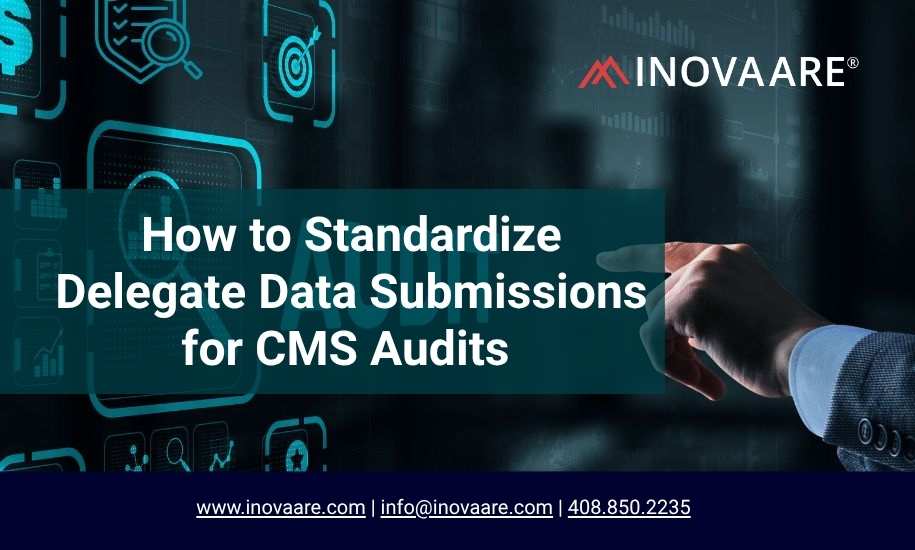Delegate oversight is a critical component of CMS audit compliance, yet challenges with inconsistent or delayed Universe file submissions often hinder the process. This blog will explore the importance of standardizing delegate data submissions and how the right tools, such as Inovaare’s Universe Management System, simplify compliance management at scale.
The Role of Delegate Data Submissions in CMS Audits
For health plans, delegated entities (First Tier, Downstream, and Related Entities – FDRs) often play a significant role in managing high-impact areas like utilization management, pharmacy benefits, and member grievances. These entities are integral to organizational operations; however, CMS requires health plans to ensure that their delegations are fully compliant with audit standards.
This means timely and accurate data submissions are non-negotiable. Any inconsistencies, delays, or errors in Universe files can jeopardize compliance, increase risks, and lead to severe penalties.
Common Challenges in Delegate’s Data Submissions
Standardizing delegate data submissions is more than just a technical issue; it is vital for maintaining compliance. However, many organizations encounter significant roadblocks, including:
- Inconsistent Templates
With each delegate using different formatting, merging and validating data becomes complex and error-prone. - Manual Coordination
Email as a primary tool for submission leads to version control issues, delays, and miscommunication. - Lack of Accountability
Without centralized tracking, differentiating between compliant and non-compliant delegates is nearly impossible. - Non-Standardized Validation Processes
Entities may apply inconsistent validation standards, leaving health plans vulnerable to CMS scrutiny.
These challenges highlight the need for a robust approach to standardizing the submission process, thereby ensuring accuracy, accountability, and audit readiness.
Explore – CMS Program Audit Readiness Playbook
Why Standardization Matters
Standardizing delegate submissions isn’t just about convenience; it’s about transforming an often-chaotic process into a streamlined operation that meets CMS’s rigorous audit standards. Here’s why it’s crucial:
- Risk Reduction
Standardization minimizes errors and inconsistencies, which could lead to audit penalties or regulatory action. - Improved Data Accuracy
Uniform data collection and reporting ensure compliance with CMS requirements and provide a robust foundation for decision-making. - Enhanced Accountability
With centralized systems, health plans can monitor delegate performance and address non-compliance in real time. - Efficient Workflow
Standardized processes eliminate manual back-and-forth, significantly reducing delays and the workload for compliance teams.
Achieving standardization fosters higher trust between health plans and CMS, building a strong foundation for sustainable compliance and audit readiness.
How to Standardize Delegate Submissions
A consistent, well-defined process is key to achieving standardization. Follow these five steps to ensure your delegate submissions are CMS-ready:
- Establish CMS-Compliant Templates
Provide all delegates with standardized templates that align with CMS requirements. This ensures uniformity and clarity from day one. - Set Clear Submission Timelines and SOPs
Define deadlines, submission formats, and validation expectations in detailed Standard Operating Procedures (SOPs). Communicate these expectations early and consistently. - Implement a Centralized Submission Platform
Create a secure platform for FDRs to upload files, check submission statuses, and receive feedback. Avoid unstructured methods like email for file coordination. - Automate Pre-Scrubbing for Delegates
Use automated, rule-based validation processes to allow delegates to pre-scrub their data. This ensures files meet CMS standards before submission, reducing compliance burdens. - Monitor Compliance in Real Time
Track delegate submissions in a centralized dashboard to identify delays, flag errors, and highlight compliance risks before they escalate.
How the Universe Management System Simplifies Standardization
Inovaare’s Universe Management System and Delegate Portal provide innovative solutions to streamline and standardize the delegate submission process. Designed to resolve common submission challenges, the platform stands out through features like:
- Template-Driven Uploads
CMS-compliant templates are built into the system, ensuring that all uploads adhere to regulatory standards. - Pre-Scrubbing Engine
Delegates validate their files using CMS logic before submissions, significantly reducing the risk of errors. - Task Status Tracking
Compliance teams can monitor submission progress across all delegates in real time, fostering transparency and accountability. - Audit Trails
Every upload, review, and edit is logged to create a detailed audit trail, enhancing defensibility during CMS reviews. - Alerts and Notifications
Automated reminders ensure delegates meet submission deadlines and provide all necessary data on time.
This system replaces outdated, manual methods with a streamlined digital solution, allowing health plans to focus on improving compliance, mitigating risks, and enhancing audit readiness.
The Benefits of Using the Universe Management System
Adopting Inovaare’s Universe Management System offers tangible advantages across compliance teams and their delegates:
- Accurate and Consistent Data
Automated validations and built-in CMS rules ensure clean and compliant submissions. - Streamlined Processes
By centralizing templates, tracking, and communication, it reduces administrative burden. - Enhanced Accountability
Real-time dashboards reveal which entities are delivering timely, CMS-compliant submissions. - Audit-Readiness
Documented audit trails and pre-scrubbing features enable confident responses to CMS audits and inquiries. - Reduced Risks and Errors
Proactive validation and centralized workflows minimize manual errors and compliance risks.
By incorporating these features, organizations ensure not just compliance, but also long-term sustainability in their audit processes.
Transform Your CMS Audit Compliance Today
Standardizing data submissions is more than a good practice; it’s a critical step toward ensuring CMS compliance and protecting your health plan from regulatory risks. Challenges like inconsistent templates and manual coordination can be daunting, but with tools like Inovaare’s Universe Management System, the process becomes seamless and efficient.
Don’t risk your organization’s compliance on outdated processes. With the right solutions, you can secure accurate data, streamline workflows, and build a more robust compliance strategy.
Take control of your delegate submissions and compliance operations today. Request a demo and experience the difference for yourself.
